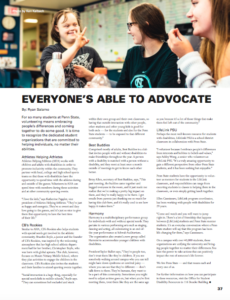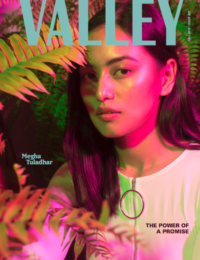
For so many students at Penn State, volunteering means embracing people’s differences and coming together to do some good. It is time to recognize the dedicated student organizations that are committed to helping individuals, no matter their abilities.
Athletes Helping Athletes
Athletes Helping Athletes (AHA) works with children and adults with disabilities in order to promote inclusivity within the community. They partner with local, college and high school sports teams so that those with disabilities have the opportunity to spend time with the athletes during and outside of the games. Volunteers in AHA can spend time with members during these activities and at other community sporting events.
“I love the kids,” says Katherine Pappler, vice president of Athletes Helping Athletes.
“They’re just so happy and energetic. They’re so sweet and they love going to the games, and it’s just so nice to give them that opportunity to have the best time of their life.”
CB’s Rookies
Similar to AHA, CB’s Rookies also helps students with special needs get involved in the athletic community. Braeden Boyle, a junior and the founder of CB’s Rookies, was inspired by the welcoming atmosphere that her high school athletic department had for her brother, Christopher Boyle, who was born with global apraxia. This club, however, focuses on Mount Nittany Middle School, where they plan activities to engage the children in the classroom. CB’s Rookies also invites the students and their families to attend sporting events together.
“Social interaction is a huge thing, especially for special needs kids in middle schools,” Boyle says. “They can sometimes feel excluded and stuck within their own group and their own classroom, so having that outside interaction with other people, other students and other young kids is good for both ends — for the students and also for the Penn State students — to be exposed to that different community.”
Best Buddies
Comprised mostly of adults, Best Buddies is a club that invites people with and without disabilities to make friendships throughout the year. A person with a disability is matched with a person without a disability, and they meet at least once a month outside of meetings to get to know each other better.
Betsy Allen, secretary of Best Buddies, says, “This past meeting the buddies came together and hugged everyone in the room, and it just made me realize that we’re making a pretty big impact on them, and they’re really happy to be there. I get emails from parents just thanking me so much for having this club here, and it’s really cool to see how happy it makes them.”
Harmony
Harmony is a multidisciplinary performance group for individuals with and without special needs. They partake in various performing arts such as singing, dancing and acting, all culminating in an end-of-the-year performance at Schwab Auditorium. The organization also created a new group called Har-Mini to accommodate younger children with disabilities.
President Taylor Balliet says, “They’re people too, don’t treat them like they’re children. If you see somebody walking around campus who you can tell might have down syndrome or cerebral palsy — where you can see that they’re different — don’t talk down to them. They’re humans, they want to be a part of this community. Sometimes you might need to adjust as time goes on, but when you’re first meeting them, treat them like they are the same age as you because it’s a lot of those things that make them feel left out of the community.”
LifeLink PSU
Perhaps the most well-known resource for students with disabilities, LifeLink PSU is a school district classroom in collaboration with Penn State.
“I volunteer because I embrace people’s differences from interests and hobbies to beliefs and values,” says Ashley Wong, a senior who volunteers at LifeLink PSU. “It’s a truly amazing opportunity to gain a different perspective from other Penn State students, and it has been nothing but enjoyable.”
Penn State students have the opportunity to volunteer as mentors for students in the LifeLink classroom, and responsibilities can range from escorting students to classes to helping them in the classroom, or even simply getting lunch together.
Ellen Cannizzaro, LifeLink program coordinator, has been working with people with disabilities for 29 years. She says, “Come and watch and you will want to jump right in. There’s a lot of friendship that happens between [LifeLink] students and Penn State mentor students. It’s an everyday conversation where a Penn State student will say that this program has been life-changing for them.”
On a campus with over 40,000 students, these organizations are unifying the university and bringing people together no matter their differences. You have the power to take actions that can positively impact the rest of someone’s life forever.
We Are Penn State — and that means each and every one of us.
For further information on how you can participate in these resources, visit the Office for Student Disability Resources in 116 Boucke Building.

